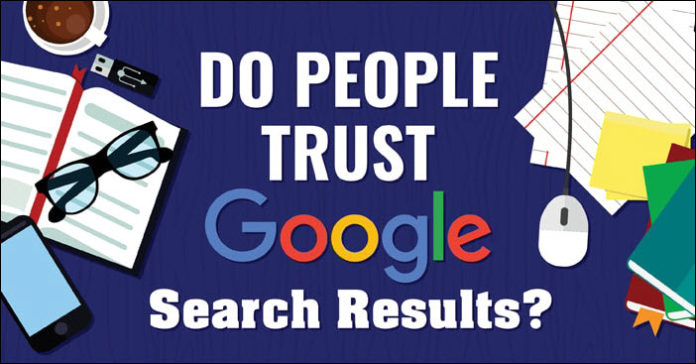The number of search queries conducted on Google each month is now north of 30 billion per month. These figures dwarf their competitors and leave Google virtually unchallenged as the World’s foremost information provider. With great power, however, comes great responsibility and Google is facing an increased level of scrutiny around the accuracy of their search results with some commentators complaining that Google search results promotes misinformation with a rightwing bias, while others claim to have identified a left-leaning bias in Google’s search results.
Whether you agree or disagree with the theories that abound about Google’s political stance, one thing is certain – there is increased pressure on the company to adhere to their own policy of a free and open web that provides high quality and authoritative search results. If there is any sense that Google is failing to do so, the likelihood is that they will face a media backlash of some sort.
To get a sense of how the recent commentary on Google’s supposed biases is affecting consumer confidence, we ran a survey that focused on the level of trust people have in Google to deliver accurate information. Our key findings include:
- Trust in Google remains high as 72.3% of respondents trust the accuracy of Google search results.
- 63.7% of respondents don’t know how Google make money from search.
- 65.3% said they would not want more relevant Google search results if it meant Google would use their search history to generate their results – something which Google is doing anyway.
Methodology
Our survey data was collected using Google Surveys. Google Surveys makes use of the inferred demographic and location information to employ stratified sampling by distributing the surveys based on the targeted audience to our publisher network and/or android smartphone users. Click here to learn more about the Google Surveys methodology.
In total, we asked 1000 people 8 questions, focusing on the areas we felt were most relevant to consumer sentiment around Google.
- Do you know how Google makes money from people who search?
- Do You Trust Google Search Results to be Accurate?
- Do you think Google search results are biased in any way?
- Do you think your Google search results are different from other people’s Google search results?
- Would you like Google to give you more relevant results IF it meant they would save and use your search history to provide them?
- Do you think it’s obvious when Google is showing you an ad versus a regular listing in Google search results?
- Which types of searches do you most trust in Google results?
- Would you rather get an answer to a question you type into Google directly from Google, or from a specific website Google links to?
1. Do you know how Google makes money from people who search?
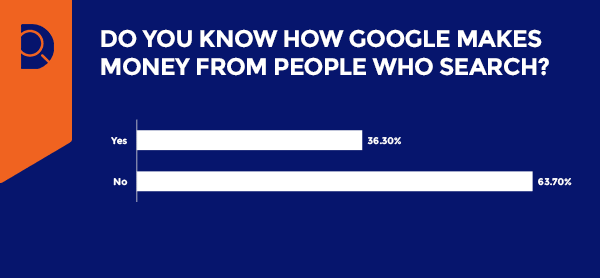
Despite the fact that AdWords and search advertising accounts for the bulk of Google’s revenue, only 36% of respondents know how Google makes money from search. For the uninitiated, companies bid for ads based on keyword search terms relevant to their business. When one of these terms is searched, Google enters the keyword into an auction with other bidders. Google’s algorithm then decides on ad rank based on a combination of cost-per-click (CPC) bid and quality score which takes into account ad click-through rate, relevance, and landing page quality. The best combined CPC bid * quality score will appear in the user’s search results page, occupying that prime above the fold real estate.
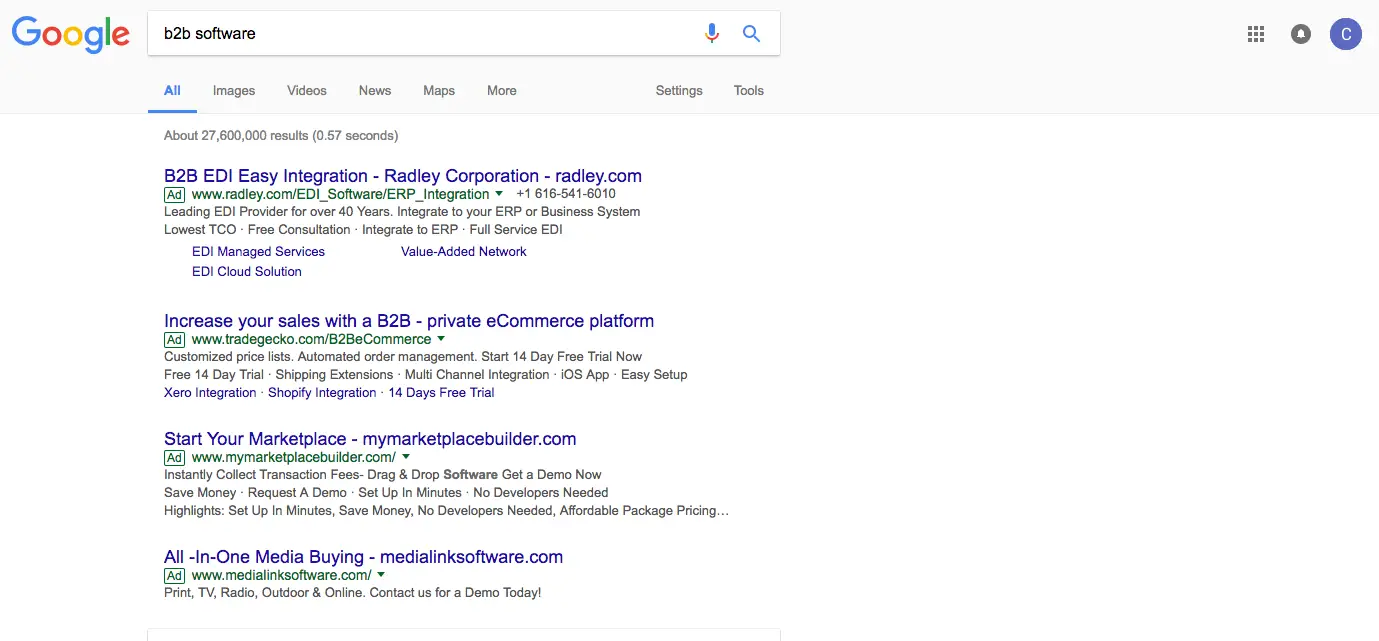
The fact that 64% of respondents don’t know how Google makes money from search would suggest that people do not realize they are seeing ads at the top of their search results. While this contention might seem unlikely, questions about the visibility of Google’s paid ads have already been raised. An Ofcom report into media use and attitudes found that 50% of people didn’t know the difference between paid for and organic search results. UX firm Bunnyfoot carried out a similar test and found out that 40% of web users were unaware of the difference between paid and organic search results.
The apparent confusion is somewhat difficult to comprehend considering Google clearly labels ads. That being said, Google has certainly decreased the visibility of paid ads over time. Ginny Marvin of Third Door Media put together an interesting graphic showing the changes in Google’s ad shading and labeling.
Google stated that testing has shown that consumers are not confused by the label change. However, it is clear that Google’s ad labeling has become more subtle over time making it harder to differentiate between paid ads and organic search results. At a company that does over ten thousand experiments a year, you can be sure that ad label changes have been thoroughly tested with the goal of driving AdWords revenue in mind. If these changes blur the lines between paid ads and organic search results, the company does not appear overly troubled.
2. Do You Trust Google Search Results to be Accurate?
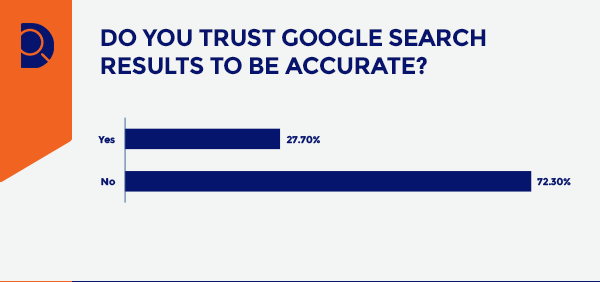
72% of our respondents trust Google search results to be accurate. This figure tallies with an Edelman survey which shows that people have more trust in headlines they read in search engines than in traditional or online media outlets. The high level of trust consumers place in Google search results comes at a time when the media landscape is becoming increasingly polarized. Social media feeds have given rise to information cocoons, where news outlets that do not fit in with the consumer’s political beliefs are ignored. The news and media companies themselves are still figuring out the best way to generate revenue in today’s digital world with news giant The Guardian expected to burn £90m in cash this year.
What is traditional news and media’s loss might well be Google’s gain. As consumers look for that single source of truth in what has been dubbed today’s “post-truth” world, Google has made some moves to fill the void. Google’s news aggregator Google News was released in 2006 and algorithmically harvests news stories from over 50,000 news sources across 72 editions and 30 languages. The number of US visitors per month is over 300 million. However, 44% of Google News visitors just scan the headlines and don’t click through leaving Google open to accusations of behaving like a “digital vampire”.
To keep up with the demand for instant information, Google launched “In the News”, later renamed “Top Stories” which presents the latest news stories on the topic at the top of the search results.

Unfortunately for Google, inaccurate news stories began to appear around the time of the 2016 US election and the company was accused of disseminating “fake news”. Here is one example.
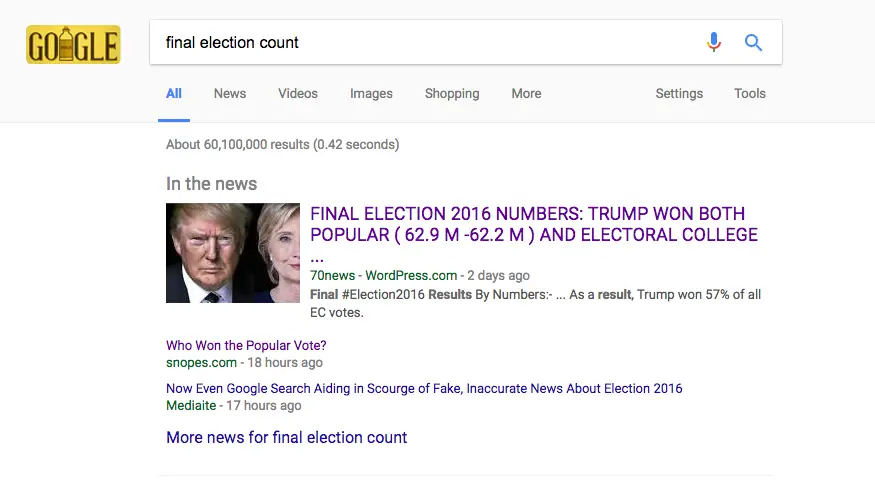
The problem was that the modules used to pull stories into the “In the News” section did not pull from Google News – which is editorially approved – instead searching the entire web for relevant and recent content. While the company has acknowledged the issue and are taking it “very, very seriously”, there has already been a number of examples of Google providing users with false or misleading information in 2017.
In spite of these various controversies, our data shows that trust in Google – at 72% – remains high. If anything it demonstrates the power of Google’s brand and reputation for accurate information. However, as the company moves into a role traditionally occupied by news and media companies they must ensure the accuracy and honesty of the news they present to users.
3. Do you think Google search results are biased in any way?
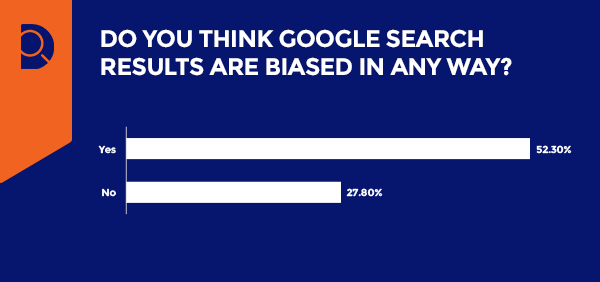
Our respondents were evenly split on the issue of Google’s supposed bias with a 52% majority answering that they believe Google’s search results are indeed biased. The fact that over half of web users feel Google search is biased might well be a residual effect of the 2016 election when a highly publicized claim that Google was selectively eliminating negative autocomplete suggestions about Hillary Clinton. Google responded to the criticism claiming that “the autocomplete algorithm is designed to avoid completing a search for a person’s name with terms that are offensive or disparaging”. Google’s defense was met with skepticism by distinguished research psychologist Robert Epstein who stated that “the way their statement is worded is that they eliminate all negatives for everybody, and that is positively not true.”
While much has been written about Google’s supposed left-wing bias, they have also faced accusations of spreading false information with a right wing bias in recent months. An investigation by the Observer contended that Google’s autocomplete function prominently suggested Neo-Nazi and antisemitic materials. Soon after the Observer report was published, Google removed the offensive autocomplete suggestions. Google’s lack of transparency into how their process works might just have contributed to accusations of bias. In the past, when offensive search results or autocomplete suggestions have been highlighted by the media, Google has quietly made tweaks to remedy the situation leaving some, including Epstein to question the human input in a process Google claims is entirely automated.
Whether or not you agree with the various arguments put forward about Google bias, it is clear that there is a growing suspicion about the impartiality of search results. Indeed interest in the term Google bias continues to rise as shown in Google trends. Unsurprisingly, interest in the term peaked in late 2016 around the time of the US election.
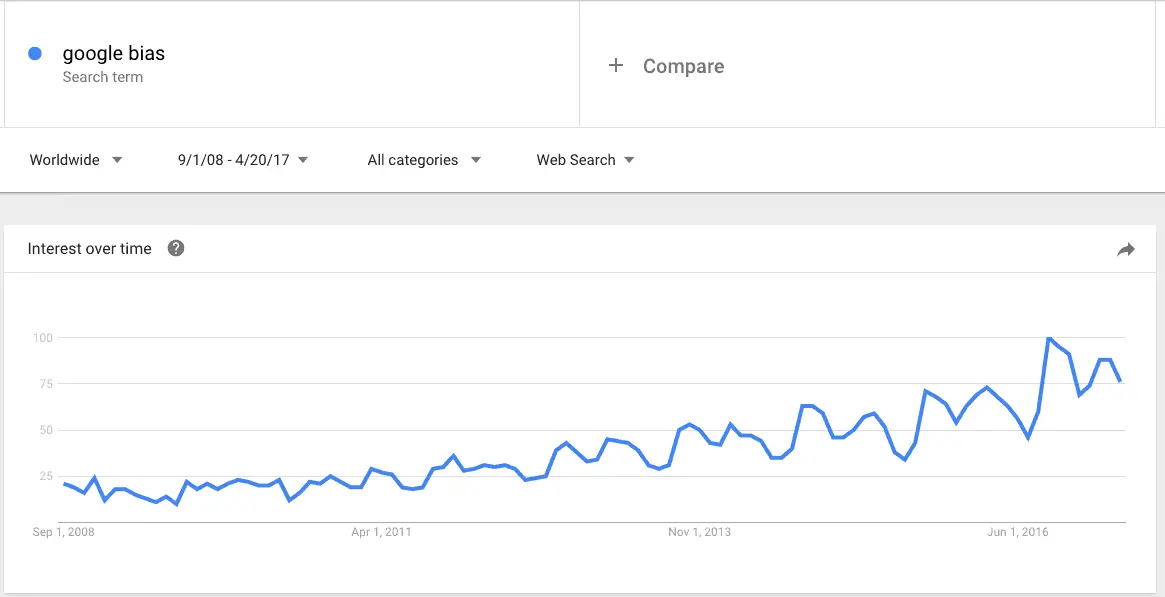
Perhaps one of the most sensible takes on Google bias was put forward by the Swedish author and journalist Andreas Ekström, who explained that unbiased search result is, in fact, a philosophical impossibility. Ekström contends that “behind every algorithm is always a person, a person with a set of personal beliefs that no code can ever completely eradicate.” The notion of the unbiased search result, according to Elkström, is nothing more than a myth.
4. Do you think your Google search results are different from other people’s Google search results?
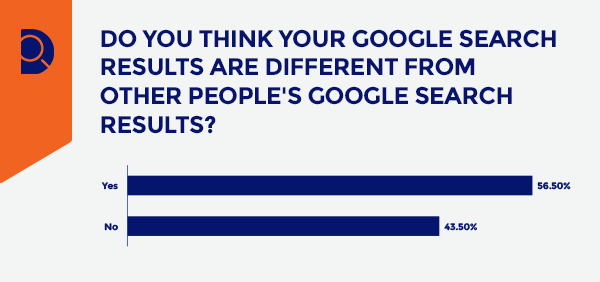
Google first began testing personalized search back in 2004 as part of a Google Labs beta. By 2005, personalized search had been implemented for signed in users, and, in 2009, personalized search became the norm for all users. Amazingly, our data shows that 43.5% of people still do not realize their search results are personalized. Google personalizes search results for the user by analyzing a range of factors including:
- IP Address/Location
- Past searches
- Websites visited
- Device
- Email/Calendar info
A separate survey conducted by Ask Your Target Market showed that 45% of users did not want personalized search results compared to 15.5% who did. Google, however, is in the business of providing the most contextually relevant search results – something that consumers have come to expect. While there are certainly legitimate privacy concerns about the amount of personal data that Google collects, it has not impacted the search engine’s popularity. DuckDuckGo, a search engine that does not track its users, was launched in 2008 and is not shy about advertising their respect for user privacy.
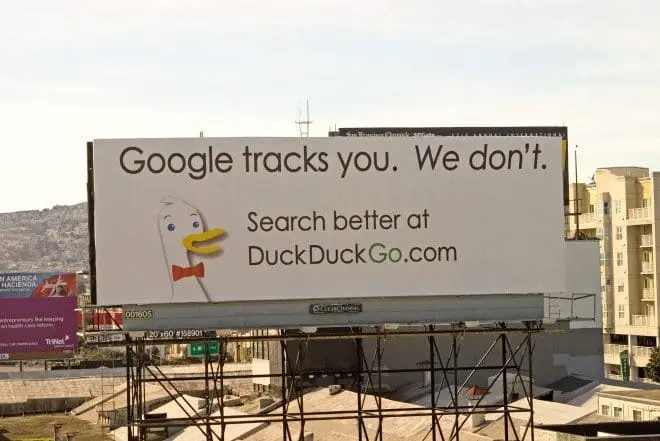
While DuckDuckGo’s service will certainly be appreciated by those whose privacy fears have been stoked by Edward Snowden’s revelations, the number of searches on the platform is around 10 million per day. For Google, an average of 350 billion searches per day is perhaps the biggest indicator that consumers are willing to trade some of their privacy for relevant search results. While our data shows that 43.5% of users do not realize their search results are personalized, it is hard to escape the sense of apathy around user privacy.
5. Would you like Google to give you more relevant results IF it meant they would save and use your search history to provide them?
Continuing along the user privacy theme, we found that 65.3% of people do not want Google to use their search history to provide more accurate results.
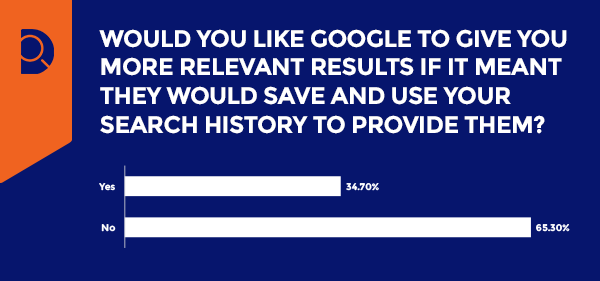
There is one small problem here – Google already factors user search history into its search algorithm. A study by the Pew Research Center shows that 91% of Americans agree that consumers have lost control over how their personal information is used by companies. The same study showed that 61% of American do not appreciate companies using their personal data to make their service more efficient.
Our data and the information gathered by the Pew Research Center demonstrates that – ostensibly at least – consumers are growing more concerned about their privacy. Actions however speak louder than words and a study published by the Association for Computer Machinery examined e-commerce shoppers behavior in relation to their self-reported privacy concerns. The study showed that shoppers failed to live up to their self-reported privacy concerns and disclosed their personal information to an anthropomorphic 3-D shopping bot. Couple these results with the widespread sharing of personal information on social media sites and it is clear that there is something of a “privacy paradox” inherent in the modern consumer.
Google is highly unlikely to be influenced by any consumer expression for increased privacy when personal details are so easily divulged. If anything, expect to see even more personalization in your search results in the future.
6. Do you think it’s obvious when Google is showing you an ad versus a regular listing in Google search results?
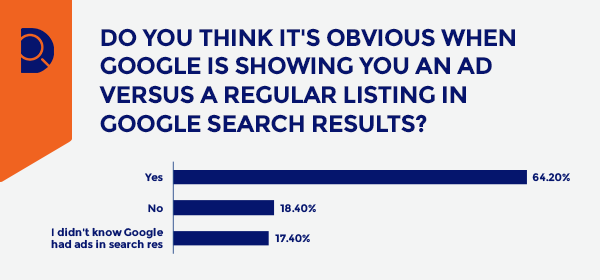
The fact that 64.2% of respondents think it’s obvious when Google is showing ad does not really tie in with the answer to question 1 which showed that 63.7% of people do not know how Google makes money from search. If a respondent is able to spot the difference between a search result and a paid ad, then surely it is not too much of a leap to figure out how Google makes money from search. One possible explanation here is that the presence of the term “ad” in the question might inform respondents that Google lists ads on its SERPs.
Regardless of the clues in the question, the fact that 36% of people can not tell the difference between ads and search results is still noteworthy. In fact, the mind does not have to wander to far to spot the revenue potential of ads that consumers mistake for search results. Such is the influence of Google that it has changed the way humans think, a listing on page one of Google search results gives your website, product, or service a certain authority that goes beyond domain strength. Such is Google’s reputation for relevance – 72.3% of our respondents trust the accuracy of Google search – that there is a reputability about appearing on page one of Google search results. If a company can buy a page 1 Google SERP with AdWords, then – at least 36% of the time – they are buying the reputability that comes with appearing on page one as well as the obvious benefit of web traffic which, of course, is paid for on a CPC basis.
The below example shows how TradeGecko might benefit with their Google ad. In this instance, there might well be an expectation on behalf of the searcher that the companies listed on page one will have earned their listing by delivering a high level of service. However, as we can see below, the highly valuable above the fold real estate is occupied by ads.
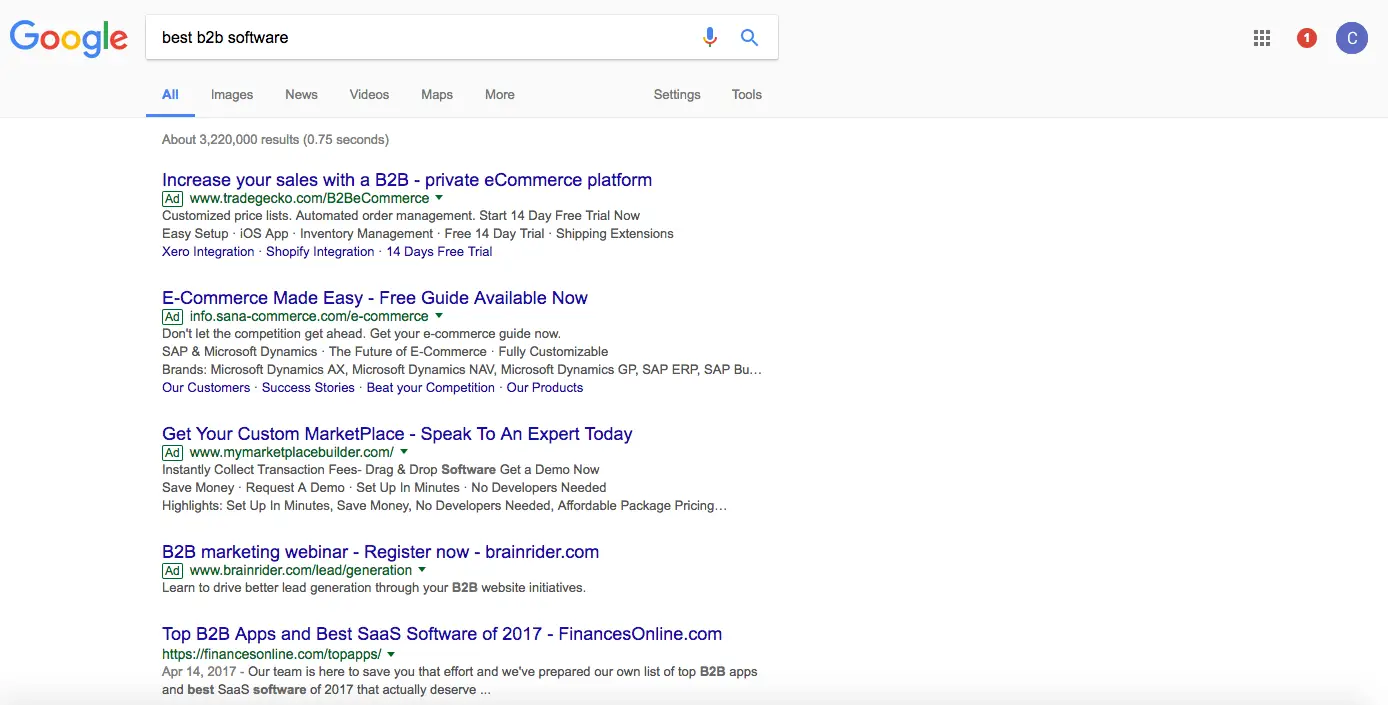
7. Which types of searches do you most trust in Google results?
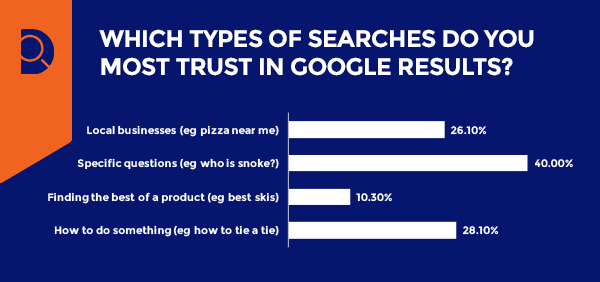
The type of search that people have most trust in Google answering correctly is an answer to a specific question at 40%. The other results were local business searches at 21.6%, finding the best product at 10.3%, and how to do something at 28.1%.
While Google search has certainly proved itself more than capable at answering specific questions, it would appear that the company would like to take their capabilities to the next level. Their artificial intelligence (AI) system RankBrain is used to help process search results. RankBrain was designed to handle long tail search queries and connect complex searches to other seemingly unconnected searches.
Local businesses can really benefit by appearing in Google’s top 3 local business listings. Here is an example of how a search for bars in Cambridge, Massachusetts looks.
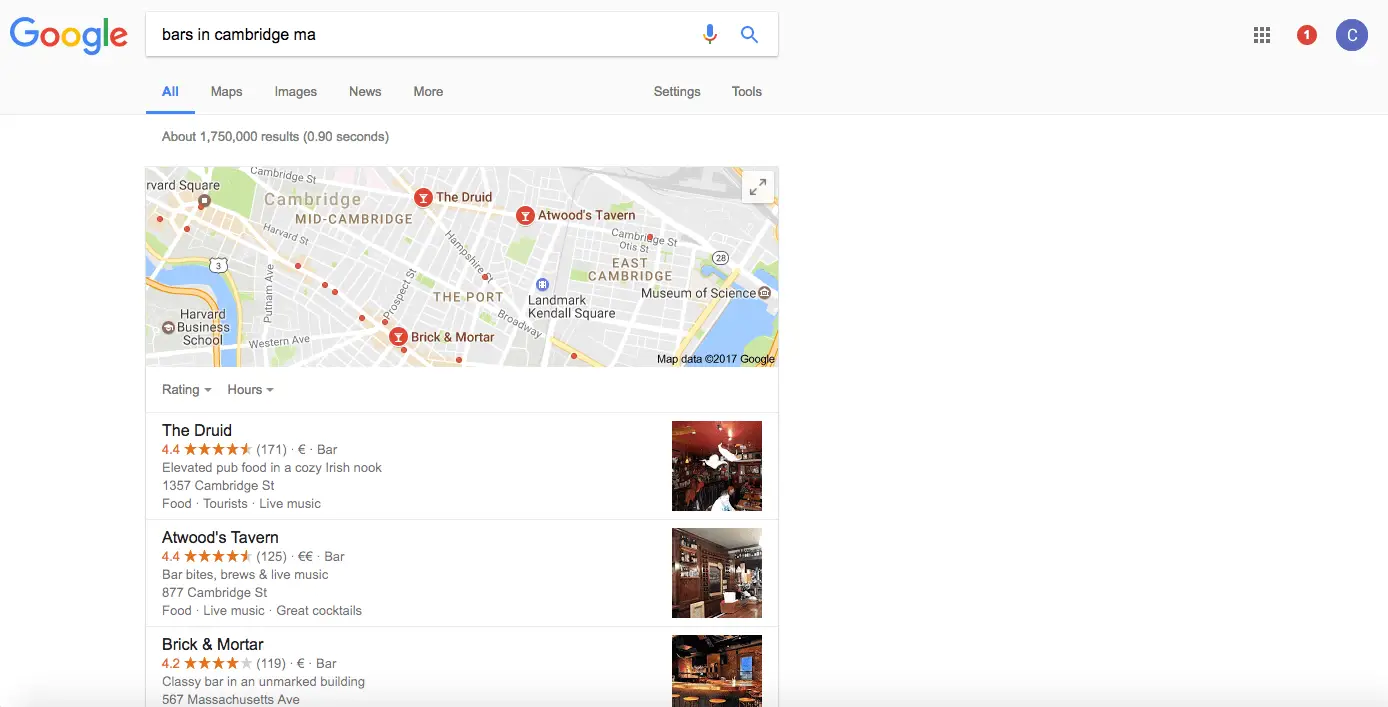
As we can see, there is room for three listing above the fold. Local businesses that want to get into the top 3 should make sure their business information is accurate, consistent, and in as many places as possible. Make sure your own website is updated as well as external directory and review sites like Yelp and TripAdvisor. Other tactics that will help you here include getting great reviews, publishing fresh and shareable content on your website, and getting some high-quality links to your site.
8. Would you rather get an answer to a question you type into Google directly from Google, or from a specific website Google links to?
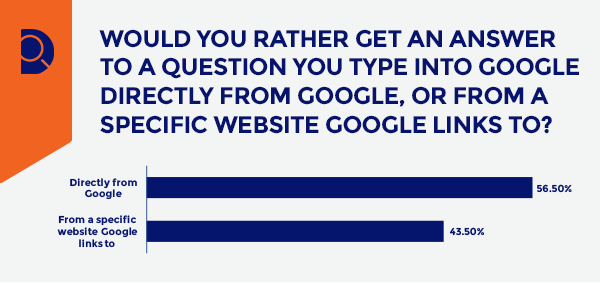
Our data shows that 64.3% of people would prefer to get their answer directly from Google rather than having to click into a link. For the convenience-loving 64.3% among us, Google’s featured snippets – launched in 2014 – make it possible to view answers on their SERP. These featured snippets, dubbed Google’s “one true answer”, have caused a fair degree of controversy.
These answers are given pride of place above all other search results and can go embarrassingly wrong as Danny Sullivan from Search Engine Land has highlighted. Google pulls these answers from sites that provide that answer the user’s query. Here is an example of a featured snippet that works as you would imagine Google intended for it to work.
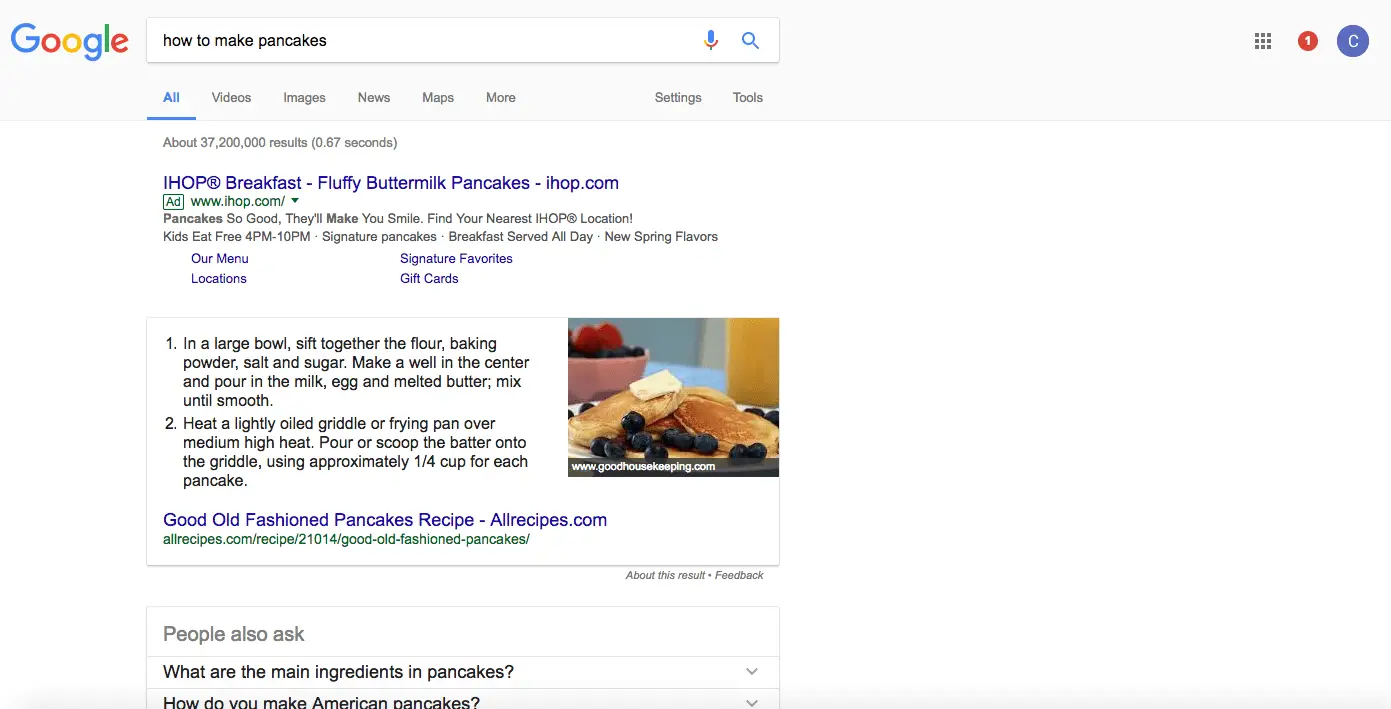
However, some questions have been answered in a surprising way.
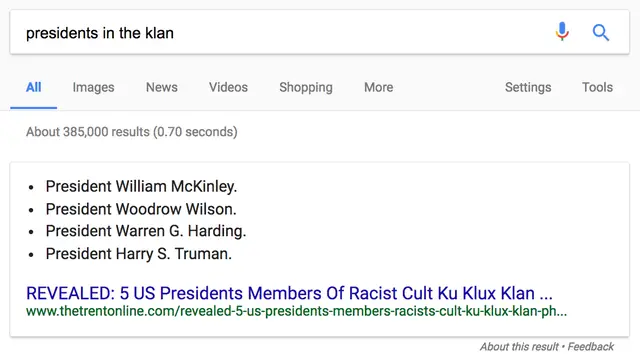

With problematic answers still arising in 2017, Google has yet to find a satisfactory solution to their featured snippet problem. However, as our data shows, it is a feature that is popular with the public. In response to the various controversies, Google stated that “the Featured Snippets feature is an automatic and algorithmic match to the search query, and the content comes for third-party sites. We’re always working to improve our algorithms, and we welcome feedback on incorrect information, which users may share through the ‘Feedback’ button at the bottom right of the Featured Snippet.”
Google’s focus on direct answers is also integral to their Google home voice-activated system and sets it apart from its competitors. While the featured snippets have not been smooth sailing for the company, there is – as is so often the case with Google – a long game at play. The featured snippets controversies the company has faced are a small price to play for potential domination in the lucrative home assistant market.



